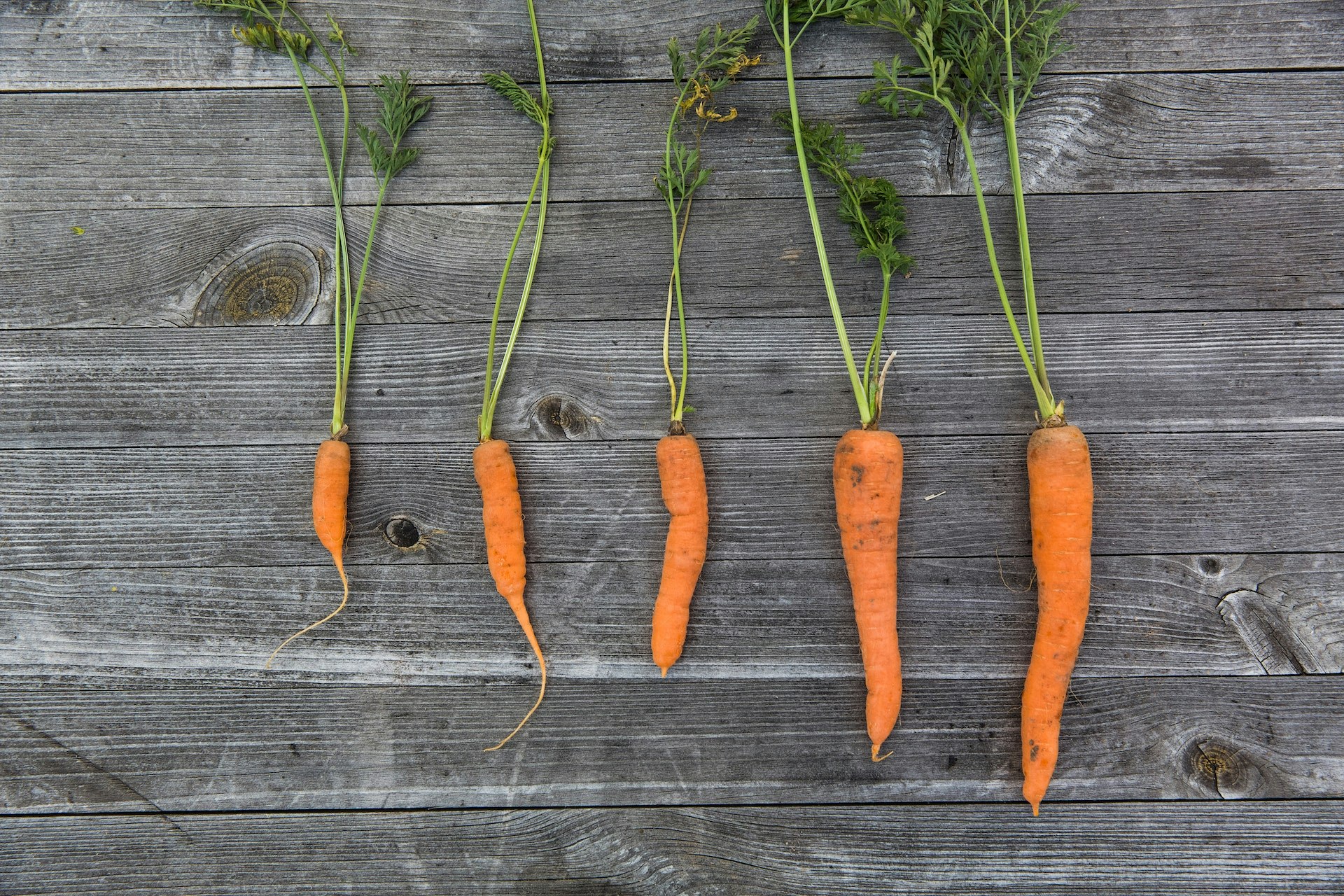The benefits of drinking carrot juice are numerous, and they extend far beyond the improvement of one's eyesight. Carrots have been lauded for their health benefits for centuries, and for good reason. Drinking carrot juice can help improve digestion, boost immunity, and even aid in weight loss.
Additionally, carrots are a great source of vitamin A, which is essential for maintaining healthy skin, eyes, and teeth. In this article, we will explore ten of the most significant benefits of drinking carrot juice, including those related to overall health and well-being.
So if you're looking for a simple and effective way to improve your health, look no further than a glass of fresh carrot juice. Let’s dive right in.
1. Nutrient Rich
Drinking carrot juice is a great way to get a concentrated dose of essential vitamins and minerals. This includes vitamin A, vitamin K, vitamin C, vitamin E, potassium, and antioxidants like beta-carotene.
Carrot juice also contains lutein – aka “the eye vitamin” – and zeaxanthin, which are carotenoid pigments that act as antioxidants and can help fight free radicals in the body.
Beta-carotene is the main carotenoid found in carrot juice, which is responsible for the orange color of carrots and is converted into vitamin A by the body.
Other beneficial vitamins and minerals found in carrot juice include thiamin (vitamin B1), niacin (vitamin B3), vitamin B6, manganese, copper, and phosphorus. These nutrients support various bodily functions and contribute to overall health.
2. Boosts the Immune System
Carrot juice has a high concentration of vitamin A, which is essential for maintaining healthy epithelial tissues like the digestive and respiratory tracts, as well as the skin. These tissues are vital in preventing infections by acting as barriers against pathogens. Consuming enough vitamin A is crucial for the immune system's proper functioning.
Moreover, carrot juice is an excellent source of vitamin B6 and vitamin C that can enhance the immune system's strength. Vitamin C supports the production and function of immune cells and acts as an antioxidant, shielding them from potential free radical damage. Here's a carrot juice recipe with an extra dose of Vitamin C.
3. Promotes a Healthy Skin
Carrot juice is a great way to promote healthy skin as it contains essential nutrients. Here are a few reasons why carrot juice may be beneficial for skin health.
Firstly, carrot juice is rich in beta-carotene which is converted into vitamin A in the body. Vitamin A is crucial for maintaining healthy skin as it helps in the production and maintenance of skin cells, promotes skin hydration, and supports the repair of damaged skin tissue.
Secondly, carrot juice contains antioxidants such as vitamin C and beta-carotene which help protect the skin from damage caused by free radicals that contribute to skin aging and the development of certain skin conditions.
Thirdly, carrot juice is hydrating due to its high water content, which is important for maintaining healthy skin by keeping it moisturized and supple.
Lastly, regular consumption of carrot juice can improve the complexion and promote a healthy skin tone due to the presence of beta-carotene which can give the skin a slightly orange tint, often referred to as a “carotenoid glow.” However, this effect is usually observed in individuals who consume large amounts of beta-carotene over a long period of time.
4. Maintains Vision
Carrot juice is packed with nutrients that are great for maintaining vision. It contains a lot of beta-carotene, which is converted into vitamin A in the body. Vitamin A is essential for vision because it helps make the pigment found in the retina of the eye, and it allows the eyes to adjust to different lighting conditions and see well in the dark.
Carrot juice is also rich in antioxidants like beta-carotene and vitamin C, which protect the eyes from damage caused by free radicals. These harmful substances can contribute to age-related macular degeneration and cataracts, which are common eye conditions.
Additionally, carrot juice has lutein and zeaxanthin, two antioxidants that act as filters in the macula of the eye. They protect the retina from harmful blue light and lower the risk of AMD and other vision problems.
5. Supports Heart Health
Consuming carrot juice can be beneficial for heart health, thanks to its nutrient content and specific properties. The juice is rich in antioxidants like beta-carotene and vitamin C, which play a crucial role in reducing oxidative stress and inflammation in the body. These factors contribute to the development of heart disease, and antioxidants help protect the heart and blood vessels against damage caused by free radicals.
If you're looking to maximize the heart health benefits of carrot juice, it's recommended to have cold-pressed or homemade juice, which has high levels of fiber, unlike commercial juices. Fiber can help regulate blood sugar levels, promote healthy digestion, and lower cholesterol levels, reducing the risk of heart disease. However, it's important to supplement carrot juice with other sources of dietary fiber.
Additionally, carrot juice is a good source of potassium, a crucial mineral that helps maintain healthy blood pressure levels and blood vessel function. The juice is also packed with important vitamins and minerals like vitamin K, vitamin B6, and folate, which support proper blood clotting, reduce the risk of heart conditions, and maintain healthy blood vessels.
6. Supports Liver Health
Carrot juice has the potential to promote liver health as it contains essential nutrients and beneficial properties. The antioxidants present in carrot juice such as beta-carotene and vitamin C help in reducing oxidative stress and safeguard the liver from damage caused by free radicals. This stress can lead to liver inflammation and the development of liver diseases.
Beta-carotene, which is converted into vitamin A in the body, is vital for the proper functioning of the liver and supports its detoxification processes. These carotenoids are important in the prevention of Non-alcoholic fatty liver disease (NAFLD) is a growing health problem around the world.
Additionally, vitamin A aids in the regeneration of liver cells. The fiber present in whole carrots and cold-pressed carrot juice is also important for liver health. It aids digestion, removes toxins and waste products from the body, and regulates cholesterol levels, which is beneficial for liver health.
Carrot juice is also hydrating due to its high water content. Staying well-hydrated is crucial for supporting liver function, as it helps flush out toxins and maintain optimal liver health.
7. Promotes Oral Health
Drinking carrot juice has additional benefits as well, such as potentially promoting oral health. The beta-carotene in carrot juice is converted to vitamin A by the body. This vitamin is crucial for maintaining healthy gums and oral tissue. It promotes the production of keratin, which is a protein that helps keep the oral mucosa healthy.
Furthermore, carrot juice is rich in antioxidants like beta-carotene and vitamin C. These antioxidants help protect the oral tissues from damage caused by free radicals. Free radicals can cause gum inflammation and periodontal disease. Antioxidants also support the immune system, which helps defend against oral infections.
Carrot juice is also hydrating due to its high water content. This is important for oral health because staying hydrated helps maintain optimal saliva production. Saliva helps to wash away food particles, neutralize acids, and maintain a healthy oral environment.
Finally, the vitamin C in carrot juice is critical for the production of collagen, a protein that supports the structure and health of the gums. Vitamin C also aids in wound healing and helps fight gum inflammation.
8. Helps Regulate Blood Sugar
Carrot juice can be a good addition to a well-balanced diet that helps regulate blood sugar. It's worth noting that, like other fruit and vegetable juices, carrot juice can contain a relatively high amount of natural sugar, which can affect blood sugar levels.
To understand how different foods affect blood sugar, you can refer to the glycemic index (GI) scale. Carrots, in general, have a low GI, meaning that they have a slower and more gradual effect on blood sugar than high-GI foods.
Fiber is an important nutrient that helps slow down the absorption of sugars, promoting stable blood sugar levels. If you're worried about blood sugar regulation, you can incorporate cold-pressed carrot juice into your diet to counteract its potential impact.
However, commercially processed carrot juice may have a higher GI than cold-pressed juice because the fiber is removed during the juicing process. This lack of fiber can lead to a faster absorption of sugars and a more significant impact on blood sugar levels.
To minimize the impact on blood sugar levels, it's important to consume carrot juice in moderation and be mindful of portion sizes. You should also consider the overall carbohydrate content of your diet and balance it with other nutrient-rich foods to support blood sugar regulation.
9. Support Weight Loss
Including carrot juice in your weight loss plan can be a good idea, but it is important to keep in mind that the weight loss process is complex and depends on multiple factors such as calorie intake, physical activity, and metabolism.
Carrot juice can potentially support weight loss in a few ways. Firstly, it is relatively low in calories as compared to other sugary drinks. Choosing carrot juice over high-calorie beverages can help in reducing overall calorie intake and contribute to weight loss.
However, if you opt for store-bought carrot juice, it lacks fiber that can promote feelings of fullness and reduce calorie consumption. Therefore, it is recommended to incorporate high-fiber foods alongside carrot juice to control hunger and support weight loss.
Additionally, carrot juice is packed with essential vitamins, minerals, and antioxidants that can benefit overall health when consumed as part of a balanced diet. It is important to consume carrot juice in moderation as excessive consumption of high-sugar beverages can lead to weight gain by increasing overall calorie intake.
10. Energy Booster
Carrot juice is a great source of iron, which is essential for producing red blood cells. Red blood cells carry oxygen to all parts of the body, so having good red blood cell function is crucial for having a large energy supply. Furthermore, carrot juice contains natural sugars, mainly in the form of fructose, which can provide a quick source of energy for the body.
Carrots are also a good source of vitamin B6, which, along with magnesium, can help to reduce the severity and length of muscle cramps. When you experience muscle cramps, it's usually a sign that you're deficient in magnesium, so your body is signaling you to increase your intake of this nutrient. Vitamin B6 works with magnesium to help strengthen your muscles.
Carrot juice is rich in various vitamins and minerals, including vitamin A, vitamin C, potassium, and other antioxidants. These nutrients are vital for energy production and overall cellular function. They play an important role in metabolizing carbohydrates, supporting the immune system, and fighting oxidative stress, which can contribute to fatigue.
Carrot juice has a high water content, which helps to maintain hydration levels. Dehydration can lead to feelings of fatigue and reduced energy levels. Staying adequately hydrated can support overall energy and vitality. Here's a carrot juice recipe that will help you meet your vitamin goals and hydrate you.
Potential Negatives of Drinking Too Much Carrot Juice
So, in summary, carrot juice, like orange juice, contains an abundance of nutrients that provide numerous health benefits. However, consuming too much of it can lead to the peculiar condition of carotenemia, which causes your skin to turn orange. This is not a major concern and can be easily remedied by reducing your beta carotene intake.
The only other potential risk of excessive carrot juice consumption, or any juice for that matter, is the possibility of ingesting too much sugar due to the low fiber content.



Comment